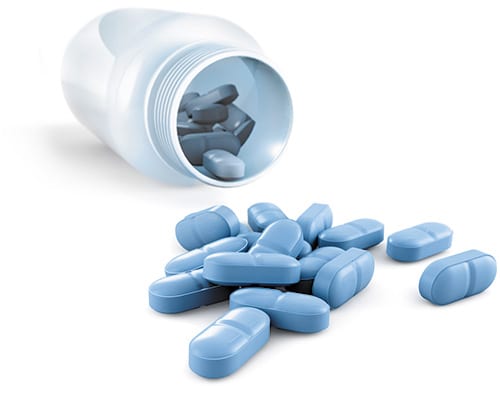Resource Center launching new PrEP clinic on Tuesday, hoping to stem the HIV infection rate

Tammye Nash | Managing Editor
The best way to fight HIV is to keep individuals from ever contracting the virus. That’s the idea behind PrEP — pre-exposure prophylaxis. And that’s why Resource Center is launching a new PrEP Clinic.
Rafael McDonnell, communications and advocacy manager for Resource Center, said this week that the new clinic opens for business on Tuesday, April 4, and that it’s initial hours will be from 2-6 p.m. each Tuesday and Thursday.
Resource Center officials are already looking at expanding the clinic’s hours, McDonnell said, because “we haven’t launched yet, or even officially announced it, and we already have a waiting list.
 “We’ll probably add some evenings and possibly some Saturdays,” he noted, adding that the center is contracting with Dr. Terry Watson, a retired local physician, to be the physician on staff.
“We’ll probably add some evenings and possibly some Saturdays,” he noted, adding that the center is contracting with Dr. Terry Watson, a retired local physician, to be the physician on staff.
PrEP, according to the Centers for Disease Control, protocol through which individuals at “a very high risk” for HIV take a daily regimen of HIV medicines to reduce their risk of becoming infected. Truvada — a combination of tenofovir and emtricitabine — when taken daily, can do just that, studies show.
“Studies have shown that PrEP reduces the risk of getting HIV from sex by more than 90 percent when used consistently,” according to the CDC’s website on PrEP.
“Among people who inject drugs, PrEP reduces the risk of getting HIV by more than 70 percent when used consistently.”
The CDC also notes that PrEP effectiveness decreases significantly when the medications are not taken consistently. And as McDonnell pointed out, it can’t work if and individual doesn’t take it.
He said that Resource Center has been “working on [launching a PrEP clinic] for about a year. It’s an idea we’ve been kicking around for some time. We have looked at peer centers around the country and we’ve seen that many of them have become more active” in terms of promoting use of and offering access to PrEP.”
The key to its effectiveness, McDonnell continued, is “getting the information out there. The studies show that one reason PrEP has not shown more progress [in stopping the spread of HIV] is that people don’t know about it. They don’t know about it from the patient’s side, and they don’t know about it from the physicians’ side of the equation.”
That’s why, he said, Resource Center worked with Texas state Rep. Rafael Anchia to write HB 2006, which — if passed by the Legislature — would mandate that any person who tested negative for HIV be counseled regarding the availability and effectiveness of the PrEP protocols.
“HB 2006 is based on a California law,” McDonnell said. “The whole idea is to get the knowledge about PrEP out there, at least on the patient’s side of the equation, to make them think about whether PrEP is the right thing for them.”
The first step in launching the clinic was the find the resources necessary to do so. A grant from the Texas Department of Health Services provided some of the funds the center needed to get the program up and running.
McDonnell said the doctor will evaluate each patient to see if PrEP would be a good strategy for them. If so, he will then give them a prescription for Truvada.
Beyond learning about the availability of PrEP and getting the necessary prescripton, the cost of the Truvada can be a stumbling block for many. According to the Drugs.com price guide, “the cost for Truvada oral tablet (100 mg-150 mg) is around $1,564 for a supply of 30 tablets, depending on the pharmacy you visit. Prices are for cash paying customers only and are not valid with insurance plans.”
Resource Center also has a plan for that, too, McDonnell said. The clinic will have “a counselor on staff to help you determine how your insurance would handle it and how much you would have to pay out of pocket. And then they’d help hook you up with the program offered through Gilead [the pharmaceutical company that manufactures Truvada] to help reduce the out-of-pocket costs.”
McDonnell continued, “Some insurance companies list Truvada as a highest-tier prescription. Some consider it a specialty drug. But what we’ve found out from others is that the assistance program [through Gilead] is able to reduce that cost significantly.
“For those who may not have insurance or may not have a very high income, it could essentially be free,” he said. “But it all depends on the insurance.”
McDonnell is also quick to note that PrEP is much more than just a prescription for Truvada.
“There is a general protocol that goes with the prescription,” he said, that includes the patient having bloodwork done ever few months to monitor for any side effects of the medications and for the presence of other sexually-transmitted diseases. It also involves counseling on risk factors for patients and their partners.
McDonnell said that not everyone is a candidate for PrEP. There “certain medical disqualifiers,” he said, “but the decision is best left to the doctor and the patient.
“This is about people taking charge of their health care. People have been doing that for some time in terms of knowing their status and using protection. This is another tool in that tool kit,” McDonnell said.
And Resource Center, he added, hopes that other agencies and organizations offering HIV services will PrEP and a tool in their tool kits, too.
“We are hoping that some other organizations here, maybe Dallas County, might consider starting their own clinics,” he said. “Tarrant County already has a PrEP clinic. But Dallas County won’t start one up immediately, and that’s probably because of the money aspect.
“But starting next week, the county will be giving information on PrEP to [everyone who comes to them for testing and tests negative]. So I think we will start off seeing increased demand, and that can only be good news in terms of prevention of HIV.”
The fact that Resource Center already has a PrEP clinic waiting list “shows there is a huge demand for this out there,” McDonnell said. “We hope to be able to start filling that need, but we ask that people be patient as we roll this out. We want this to work as smoothly as possible.”
For information or to get on the waiting list for Resource Center’s PrEP clinic, call 214-540-4477.
This article appeared in the Dallas Voice print edition March 31, 2017.

